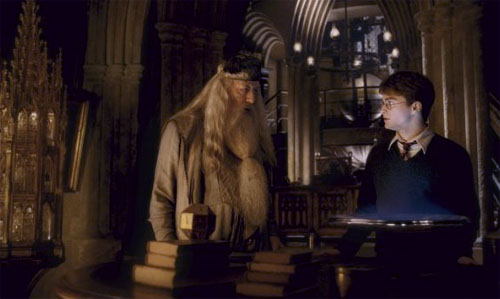Group Review: Harry Potter and the Half-Blood Prince

The latest Harry Potter movie, Harry Potter and the Half-Blood Prince, opens today in local theaters (and everywhere else). Rather than write the traditional long review, several of us at Slackerwood who have seen the movie thought we'd all pitch in and share our thoughts on the film. Let us know if you like this format -- we're considering it for other upcoming movies.
Let's start with Debbie Cerda:
As the sixth film in the Harry Potter series, Harry Potter and the Half-Blood Prince is definitely made for an audience familiar with the young wizard and the history of Hogwarts. There is very little exposition, but the tight screenplay delivers a lot of the familiarity of many of the characters that fans have grown to love or hate.
The returning cast members hit their marks well, especially Alan Rickman as Professor Severus Snape. I would have loved to have seen more of Julie Walters as Molly Weasley. However, the best performance by far was Jim Broadbent as Professor Horace Slughorn. His rendition was understated for the character as I'd imagined from reading the book, but this only strengthened his role. Professor Slughorn is a victim of his own pride and arrogance, who realizes too late that's he has contributed to the power of Voldemort.
This movie differed from the others in the series by focusing less on the action and more on the romantic relationships between the students. Notably missing scenes from the book are the actions of the Order of the Phoenix and the climatic confrontation at Hogwarts with the Death Eaters. Since I am more a fan of the books than the movies, I was disappointed by the lack of several pivotal scenes.
The interactions between the maturing teens as they struggle with romantic challenges effectively move the plot along. The special effects are so well done that I didn't find myself thinking "How'd they do that?" Instead I was fascinated by the scenes of the Pensieve, used to show Harry the collected memories about Voldemort's past. The Quidditch match sequence in this film was the best I've seen of all the Harry Potter movies.
Next, some thoughts from Jenn Brown about the film:
Opening with a very public attack on Muggles, Harry Potter and the Half-Blood Prince is the ultimate coming-of-age film as Harry and his peers deal with the emotional upheaval of teen romances gone awry and the increasing attempts to bring the battle between good and evil to the confines of Hogwarts. Dumbledore enlists Harry's help in retrieving a crucial memory regarding Tom Riddle, the boy who become Voldemort, which requires Harry ingratiating himself to Potions professor Slughorn. Harry gets a second-hand potions book belonging to someone describing himself as the "half-blood prince" when he's forced to take Slughorn's advanced class. To make things interesting, Malfoy has been tasked by the Dark Lord for some ominous act, which Snape swears to help him complete, leading to a shocking climax.
Ironically, so much is edited out from the book to trim this 153-minute story, that it feels like an over-pruned bonsai. It's lush, compact, and off balance. There's simply too much to be included, and the story suffers in focus and still runs long. Characters like Nigel get sidelined, and the title character, this mysterious half-blood prince, is reduced to exposition. Unfamiliarity with the story will make it even harder to follow.
The actors can't be blamed, as they throw themselves into their roles wholeheartedly. Ron (Rupert Grint), who is usually the comedic relief, has the worst sort of girl troubles: an over-loving girlfriend. Jessie Cave's interpretation of Lavender Brown goes from crush-crazy to lovestruck with subtlety and outrageousness in equal measure. Even Tom Felton gets to be more than sneering, pouty Malfoy, as he struggles with the burden of his task. Julie Walters, whose Molly Weasley is usually just background, has a memorable, simmering moment after a particularly personal Death Eater attack.
After the students spent the last film teaching themselves Defense against the Dark Arts, and Voldemort made so public an appearance, the momentum is lost in this film even with the introduction of teenage romantic hijinks and the Slughorn silliness.
Still, the shocking climax is well played and particularly well acted. The denouement is poignant, and the two scenes set up the next two films well. However, the final scene is awkward and trivializes the previous scenes. Overall it was disappointing, as the sum didn't add up to the parts, with so many missing. Still, I can't say I didn't like it. It has the disadvantage of being an installment that sets up the final two films.
Finally, Jette Kernion excerpts her review of the film at Cinematical:
Screenwriter Steve Kloves, who has adapted most of the Harry Potter books at this point, has neatly pared down and reshaped the novel to fit in a feature film structure and length. Instead of trying to squeeze all the Hogwarts goodness into 2.5 hours, he has cut whole subplots and minor characters so we can focus on the most important elements of the tale. As a fan of the book, I missed Bill and Fleur, wished Neville had something to do, and was sorry not to see Emma Thompson as Professor Trelawney. The house-elves are also gone, and the politics of the Ministry -- with some of these omissions, it'll take mighty smart scripting to hit certain plot points in the adaptation of the final book.

